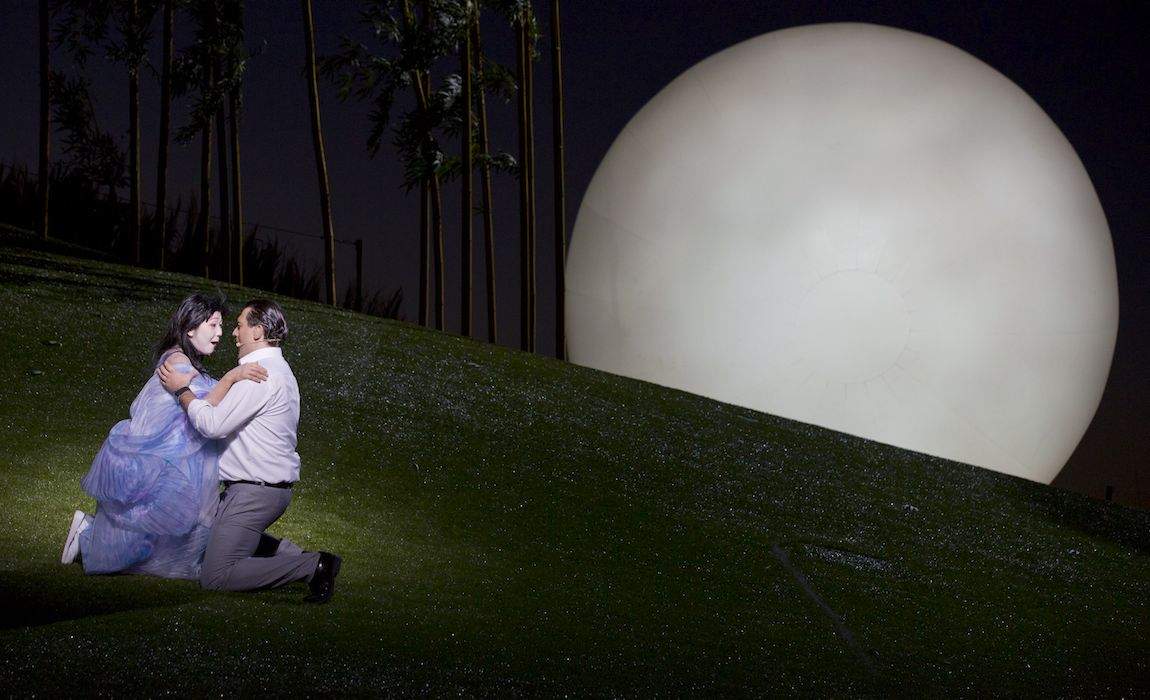Madama Butterfly – Handa Opera on the Harbour
The most impressive outdoor event in Australia this year turns Japanese.
Overview
It's one of the disappointments of opera in Sydney that once there, you can no longer see the Sydney Opera House. That all changes for one month of the year, when Handa Opera on the Harbour sets up at Mrs Macquarie's Point for a floating outdoor opera with an eye-popping view of Sydney's natural and artificial bounties, including the Opera House and Harbour Bridge beyond.
The program of three operas — first La Traviata, then Carmen and now Madama Butterfly — has proved monumentally successful. At a time when opera is struggling to attract audiences, Opera on the Harbour not only sells tickets but lures in thousands of opera newbies. You don't need to understand opera to understand what makes the occasion great.
Each of the three shows have been excellent, but Madama Butterfly is the best yet. Modern Spanish opera interpreters La Fura del Baus have put their own spin on things, not necessarily striving to be bigger and better than what's gone before but simply striving to be different.
The set is in many ways more subtle. The 'spectacle' here is in metres of billowing red silk, in city lights shining through a mini forest of real bamboo and in glowing inflatable orbs — the sun and moon — orbiting the water stage. It's beautiful, inventive and stylish, and it complements the surroundings more than ever before.
The spectacle is also in the act of construction; in the extended interval, you can either leave your seat for a glass of sparkling and Japanese snacks on the waterside promenade, or you can stay where you are and watch as an entire house is built on the green by cranes for act two. So: ambitious.
Madama Butterfly is, as seems to be the way in opera, a story of tragic love where the woman has to die at the end. It's a relatively simple and short three acts. The relationship between Japanese teenager Madama Butterfly, or Ciocio-san (Hiromi Omura), and her American sweetheart, BF Pinkerton (Georgy Vasiliev), is one defined by colonialism and exploitation (here, it's modernised quite gracefully and recalls a mail-order bride-esque scenario).
For Pinkerton, Butterfly is an exotic diversion but not a 'forever' wife. For Butterfly, Pinkerton is her idol, and she waits three faithful years for his return to Nagasaki, even when it's obvious to everyone else that he's abandoned her. He doesn't know that he has a son; she doesn't know that he has a new wife. She is so patriotic for her new country she wears Daisy Dukes and an American flag singlet. Tragic indeed.
Although the orchestra is locked away beneath the stage, there is still ample room to appreciate the music of Puccini's Madama Butterfly. Though it doesn't contain the familiar 'hits' of something like Carmen, it's an interesting and character-filled score inflected by Japanese folk melodies, and it is sung with great feeling and resonance by the leads.
Opera on the Harbour is not a cheap night out, but at least you can be assured that even the 'cheap seats' (C reserve is $99, D reserve $79) afford a good, unobstructed view. The event has so far only guaranteed funding for these first three years. Odds are, it'll find more, but if it doesn't, you'll be extra-kicking yourself that you missed out this time.
Image by James Morgan.







